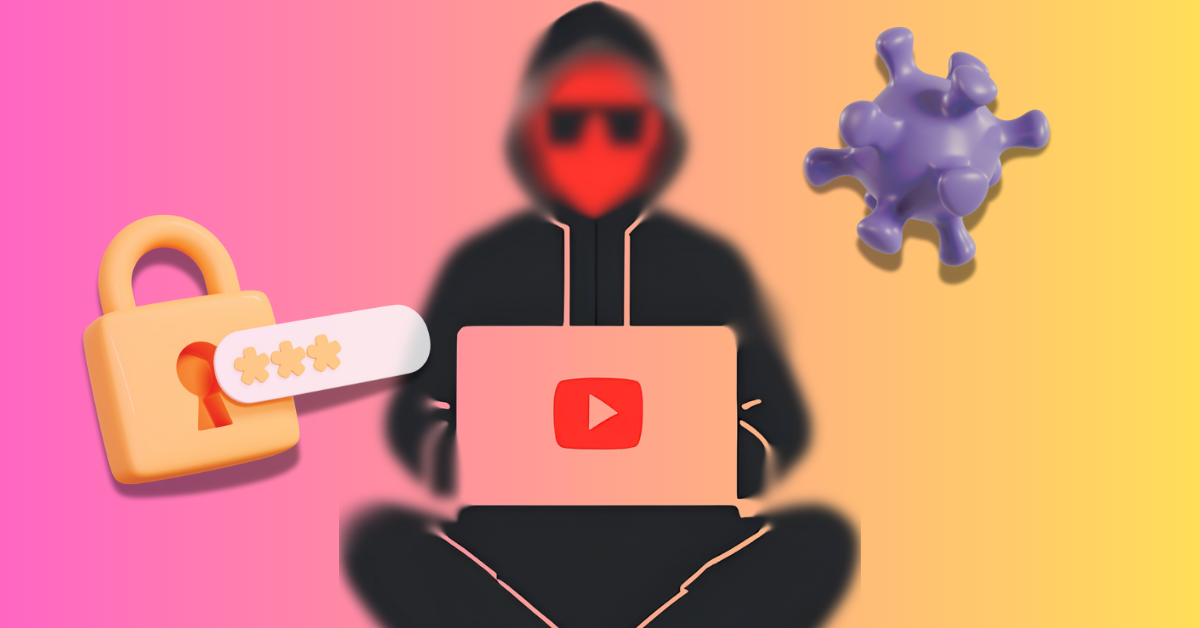It takes a lot of time, energy, and effort to grow a YouTube channel. It only takes one mistake to open the door to YouTube hacks and lose it all.
It’s tempting to assume that hackers would only go after big channels but that’s simply not the case. Hacking is a volume game and smaller channels are just as much a target. Perhaps even more so, because the chances are higher that those smaller channels haven’t taken the steps to protect themselves.
As you go through all the hard work to grow your YouTube channel to 4000 of watch time and as you reach and surpass 1000 YouTube subscribers, you also need to take some steps to protect your channel.
Tip 1 for Avoiding Youtube Hacks: Enable 2-Step Verification

2-Step verification (2SV), AKA Two-factor authentication (2FA), adds an extra step when logging in with the Google account associated with your YouTube channel. That can mean getting a text message sent to your mobile number, or using a tool like Google Authenticator (Android | iOS) to get a unique code each time you log in.
While it’s not foolproof (channels can still fall victim to phishing attempts and malware scams) it does offer a powerful layer of protection. Even if your password falls into the wrong hands, 2FA can save your bacon. Learn more about 2FA/2SV and enable it for your channel immediately.
Tip 2 for Avoiding YouTube Hacks: Set Channel-Level Permissions
As your channel grows, you might need to give others access to your channel. These could be people you’ve hired or contracted to help, they could be brands that need some level of access for reporting results in a brand deal, etc.
First off, setting the right level of access to your channel is important to avoid YouTube hacks. Give out permissions very carefully and thoughtfully, and check your YouTube channel permissions regularly to remove anyone that doesn’t need access.
Learn more about setting YouTube channel permissions.
Tip 3 for Avoiding YouTube Hacks: Use a Strong Password
Your YouTube channel needs a strong password. You should never share your password. You should never re-use passwords. You should use a combination of letters, numbers, and symbols.
In addition to using a strong password, you also need to make sure your Google account recovery information is up to date for your YouTube channel. Because if you need it, it’s already too late.
The obvious downside of a strong password is that it’s basically impossible to remember.
Use a solid password manager like 1Password or LastPass to keep all your passwords straight. Google’s own password management tools are a solid choice too and also have the advantage of being free.
The main benefit of a password manager is you no longer have to remember passwords, which in turn allows you to create the strongest passwords possible.
Tip 4 for Avoiding YouTube Hacks: Get Smart about Phishing and Malware

If you (or someone with access to your channel, see tip 2 above) falls for a phishing scheme or installs malware, all your security efforts can amount to nothing.
Phishing is an attempt to trick you into revealing personal information, such as a password or a 2FA code. It can also be an attempt to get you to download files or software which hide a nasty payload.
The thing is, phishing scams have gotten so much more sophisticated. We’re no longer dealing with princes from some far-away land looking to reclaim their fortune, or obvious . We’re seeing sophisticated phishing scams targeting YouTube channels have used PDF made to look like important contract details for a brand deal to deliver malware. Or phishing attempts that look like a legit YouTube communication, sending users to a page where they need to log in and provide 2FA details.
Stay Safe and Don’t Get Hacked!
A chain is only as strong as its weakest link. To lessen the chances that your YouTube channel gets hacked, you need to:
- Set 2FA/2SV to add an extra layer of protection
- Monitor your channel permissions and don’t give our permissions lightly
- Use a strong password, and don’t reuse passwords
- Be on the lookout for phishing and other schemes
While YouTube takes its responsibility to protect channels from fraud seriously, it’s on individual channel owners to do everything they can to protect their channel. While scammers are always cooking up new schemes, by following the steps outlined above, your channel will be much more difficult for hackers to compromise. And since, as we mentioned, hacking is a volume game, if you protect your channel, those hackers will move on to easier pickings.
